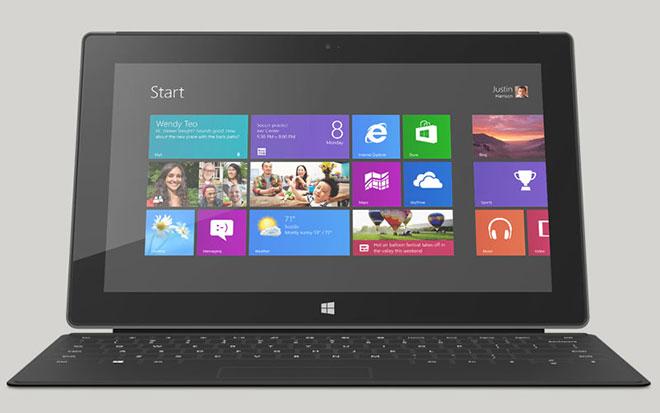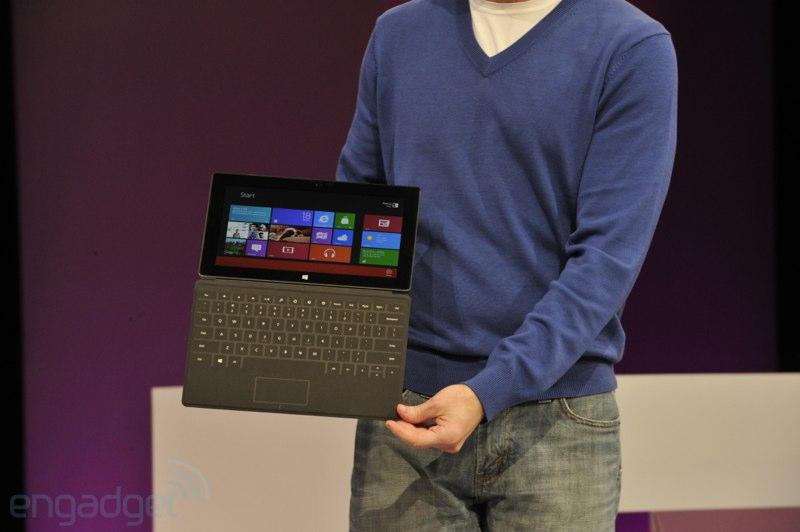Microsoft: 'No Plan B' as Surface struggles against iPad
If Microsoft's Surface tablets fail to take off, the company does not have a backup plan so much as a plan to keep tweaking its approach until Surface succeeds, according to the company's chief financial officer.
Speaking at the Goldman Sachs Technology and Internet Conference on Wednesday, Microsoft CFO Peter Klein dismissed the notion that the company should be working on a "Plan B" for the mobile sector.
"It's less 'Plan B' than how you execute on the current plan," Klein said, according to Reuters. "We aim to evolve this generation of Windows to make sure we have the right set of experiences at the right price points for all customers."
Despite considerable effort and marketing dollars, Microsoft's Surface tablets have debuted to tepid overall reviews and disappointing sales. Fewer than 900,000 Surface tablets were sold in the fourth quarter, according to figures from Gartner. The iPad, the tablet market leader Microsoft hopes to supplant, sold 23 million units last quarter.
The iPad is available in more outlets than the Surface, since Microsoft initially restricted sales to its own retail stores and online. Microsoft has since moved to get its productivity-oriented tablet into more outlets, though it is uncertain what impact that increased visibility will have on sales. Klein said getting Surface and other Windows 8 devices to sell more briskly was a "nuanced" matter.
"It's probably more nuanced than just you lower or raise prices," he said. "it's less a Plan B and more, how do you tweak your plan, how do you bring these things to market to make sure you have the right offerings at the right price points."
The Surface tablets — which came in a Surface Pro model that runs the full Windows 8 and a Surface RT model that runs Windows RT — represent a considerable departure from Microsoft's usual mode of operating. In the past, the Redmond software giant has been content to let others manufacture computers to run its Windows software. The advent of the "Post PC Era," though, has seen most of those traditional manufacturers faltering, while consumers increasingly opt for Apple's iPad and, to a lesser extent, other mobile devices.
Microsoft's answer to this trend was to retool its Windows operating system in order to be more touchscreen-friendly, but also to enter the computing hardware market itself, unveiling the Surface tablets without giving prior warning to any of its manufacturing partners. Some of those partners expressed at their software partner's move onto their turf; several of them have since announced small excursions of their own, testing the waters with Chrome OS, Google's fledgling rival to Windows.
Klein's comments on the future of Surface and any potential alternatives for Microsoft are in keeping with past behavior and recent indications for the company.
The original Xbox failed to approach the monumental sales of its main competitor, Sony's PlayStation 2, and the Xbox division lost Microsoft billions over the years. Still, the company stuck with the platform and is now arguably the best positioned among the major console makers to lead the way in connected living room entertainment.
The Surface project may follow along the same lines. In August of last year, two months before the first Surface tablet even launched, job listings appeared showing that Microsoft was looking to bring on talent for the next generation of Surface devices. Klein in his interview was not forthcoming with what Microsoft may have waiting in the wings, though, declining to say whether Microsoft will
Microsoft and its partners, Klein said, are "well set-up to deliver the most versatile experiences across form factors."
 Kevin Bostic
Kevin Bostic












 William Gallagher
William Gallagher
 Malcolm Owen
Malcolm Owen
 Marko Zivkovic
Marko Zivkovic
 William Gallagher and Mike Wuerthele
William Gallagher and Mike Wuerthele

 Wesley Hilliard
Wesley Hilliard
 Andrew Orr
Andrew Orr








